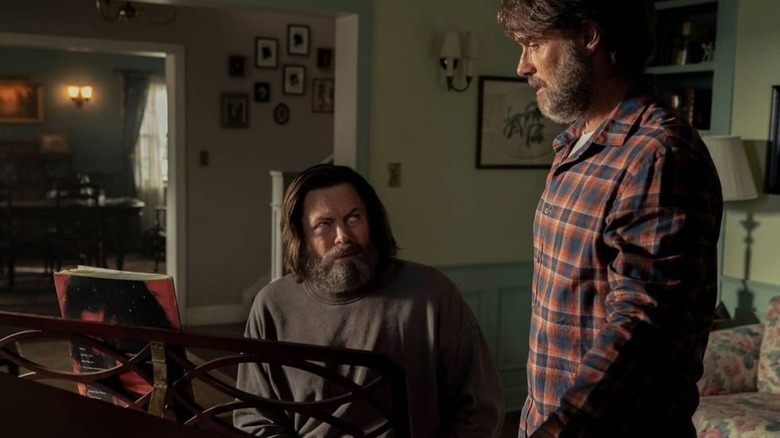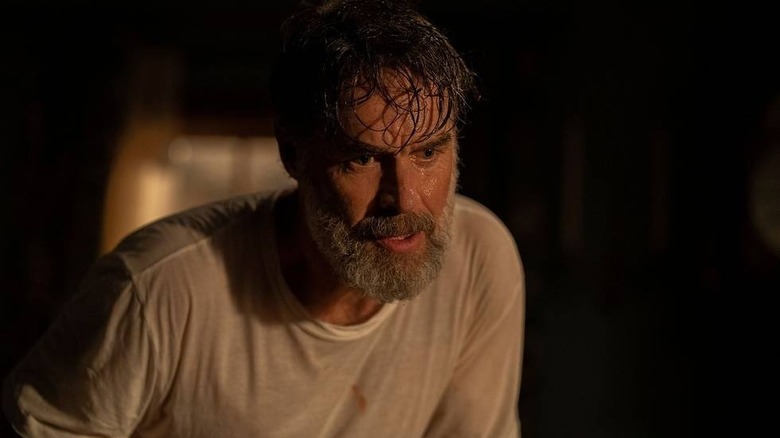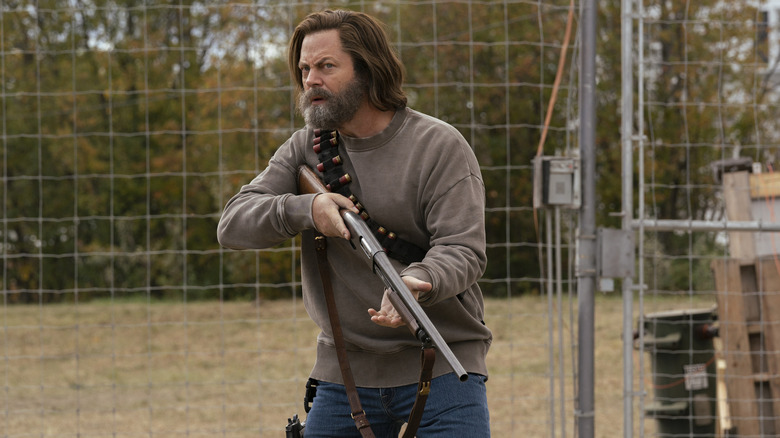HBO's The Last Of Us Changes A Key Video Game Relationship, And For The Better
This post contains spoilers for HBO's "The Last of Us" as well as the original video game.
"The Last of Us" has been a fascinating adaptation so far. It is incredibly faithful, almost to a fault, and feels like you're watching cutscenes from the game. Indeed, from lines of dialogue to even camera movement, the HBO show from Craig Mazin and game co-creator Neil Druckmann masterfully brings the story of Joel and Ellie to life. Meanwhile, Pedro Pascal and Bella Ramsey embody the characters to the point where it feels like they've played them for years.
And yet, the show has been unafraid to make changes, small ones and big ones, and it is here that "The Last of Us" truly shines. There's the cold open of the first two episodes, which provide some context to the nature of the outbreak and the first attempts to stopping the spread of the infection. Now, we get the single best episode of the season, one that makes a significant change to the story and makes the best case yet for this adaptation to exist.
A rare happy ending in a rather dark world
In the game, Bill is mostly there to teach the player how to make pipe bombs, to introduce the threat of the bloaters, and to show Ellie the first location outside the big city, where they see the effects of the outbreak on the country at large. We meet Bill as the ultimate paranoid suvivalist, a man who trusts no one, and only helps Joel begrudgingly. We find out that Bill's partner, Frank, has died by suicide after being bitten by infected, leaving a note for Bill saying he hated his guts. It is a rather bleak chapter, showing how impossible it is for anyone to find love, let alone a happy ending, in the post-apocalypse.
The live-action show starts like you would suspect from any zombie story where a stranger comes to a secluded and safe location looking for shelter. Bill is initially very distrustful of Frank, but the two quickly felt a kinship with each other and became a couple. We see them through the years, their good and bad days, their fights over whether to manage resources or fix up the neighborhood, we see how the threat of the infected gives way to the threat of raiders, and how they befriend Joel and Tess.
At every turn, you expect something bad to happen, for one to betray and leave the other, for infected to overwhelm and kill them — but it doesn't happen. Theirs is a rare and relatively happy story within arguably the darkest genre ... until we jump forward in time to the show's present, where Frank is fighting an incurable disease and decides to end it on his own terms.
Finding a light in the darkness
This leads to an absolutely heartbreaking sequence set, of course, to Max Richter's "On the Nature of Daylight, as we see Bill and Frank have one final nice day together, get married, and recreate their first dinner. It is essentially the opening act of Pixar's "Up" and equally as tear-jerking.
This is simultaneously a very hopeful and sweet episode, but an incredibly dark and bleak one too. This is a post-apocalyptic hellscape with seemingly no hope to cure the disease that has torn the world apart, where it is so hard to find someone to care about, let alone love — so when you do find it, it is impossible to imagine a world without that person.
What makes the sequence, and the entire episode, so touching and moving is that even if it is still kind of the same outcome as the game, and even if the message is pretty bleak, it decides to stare into the abyss and offer some comfort and love rather than fall to despair. The game is already pretty bleak and near devoid of hope. Bill and Frank having not only a happy life together, but sharing the same ending in peace, shows that it doesn't have to be that way, that even in darkness there can be some light.


